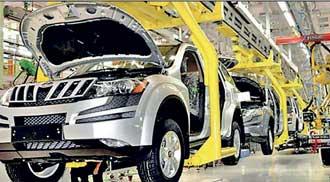11 May 2024 - {{hitsCtrl.values.hits}}
 Sri Lanka will see the addition of automobile assembly plants, as four are set to begin operations within the next three months and another 11 have been registered by the Industries Ministry.
Sri Lanka will see the addition of automobile assembly plants, as four are set to begin operations within the next three months and another 11 have been registered by the Industries Ministry.
A Special Cabinet-appointed Committee oversees the Standard Operating Procedure (SOP) and its governance.
JAC and FOTON are among those gearing up to start assembling in Sri Lanka. By end-2024, the ministry expects to have around 30 entities operating in the local automobile assembly industry.
Accordingly, the local automobile assembly industry is experiencing a significant growth and development with the involvement of the world-renowned brands, including Hyundai, Proton, BAIC, DFSK, Wuling, Mahindra, TATA, Bajaj, TVS, JMC and Lanka Ashok Leyland, emphasising the favourable environment for investment.
The approval to assemble a wide range of vehicles, including SUVs, cars, two-wheelers, double-cabs, trucks and buses, has paved the way for a diversified automobile assembly industry in the country, catering to various consumer needs. Nwow electric bikes, KD Rize, Dyno and Senaro are also involved in the local assembly
of motorcycles.
Following the SOP launched in 2021, there are over 15 automobile and motorcycle assembly plants currently operating in Sri Lanka.
According to Industries Ministry Sector Advisory Committee for Automobile Chairman Dimantha Jayawardena, the Sri Lankan automotive component manufacturers went through one of the toughest business cycles from 2020.
“The Sri Lanka government is promoting automobile component manufacturing as a trust sector for growth and has a plan to grow exports from US $ 200 million to US $ 1 billion,” he said in a statement.
The temporary suspension on motor vehicle imports has increased the market for locally assembled vehicles. The planned establishment of an R&D and testing facility by the Industrial Development Board indicates a commitment to innovation and quality assurance within the industry, to further enhance Sri Lanka’s competitiveness in the global automotive market.
The Automobile Industry Council, initiated by the government, is also laying out the curriculum for the required technical and vocational education for automobile assembly.
The Industries Ministry is sponsoring 50 percent of the cost of the IATF certification for local automotive component manufacturers, which is a mandatory requirement when manufacturing components for international brands. Sri Lankan companies with the IATF certification will have greater acceptance and trust from global brands for automobile assembly.
According to Jayawardena, global brands are also keen to invest in Sri Lanka because the country lies astride major supply chains linking trade between east and west.
“More and more Sri Lankan consumers are also showing a preference for locally assembled vehicles. This is a great boost to the industry as it further creates engineering and technical-related job,” he said.
22 Nov 2024 4 hours ago
22 Nov 2024 6 hours ago
22 Nov 2024 6 hours ago
22 Nov 2024 7 hours ago
22 Nov 2024 8 hours ago